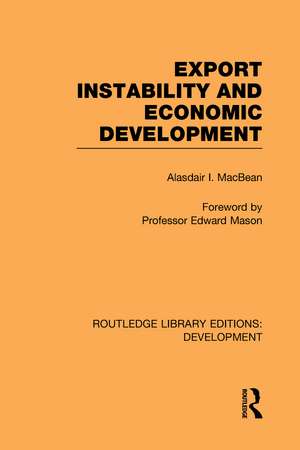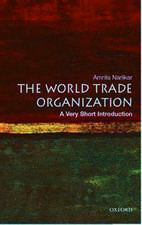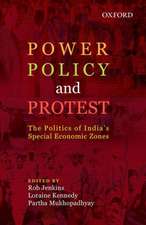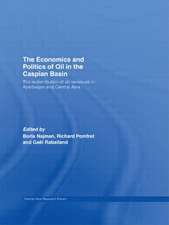Export Instability and Economic Development: Routledge Library Editions: Development
Editat de Alasdair Macbeanen Limba Engleză Hardback – 26 noi 2010
Din seria Routledge Library Editions: Development
- 34%
 Preț: 823.99 lei
Preț: 823.99 lei - 34%
 Preț: 993.32 lei
Preț: 993.32 lei - 33%
 Preț: 528.32 lei
Preț: 528.32 lei - 34%
 Preț: 822.01 lei
Preț: 822.01 lei - 34%
 Preț: 765.95 lei
Preț: 765.95 lei - 34%
 Preț: 765.23 lei
Preț: 765.23 lei - 18%
 Preț: 1173.28 lei
Preț: 1173.28 lei - 34%
 Preț: 762.72 lei
Preț: 762.72 lei - 34%
 Preț: 823.99 lei
Preț: 823.99 lei - 34%
 Preț: 824.17 lei
Preț: 824.17 lei - 34%
 Preț: 824.89 lei
Preț: 824.89 lei - 34%
 Preț: 823.63 lei
Preț: 823.63 lei - 34%
 Preț: 765.95 lei
Preț: 765.95 lei - 34%
 Preț: 852.88 lei
Preț: 852.88 lei - 18%
 Preț: 1059.93 lei
Preț: 1059.93 lei -
 Preț: 375.97 lei
Preț: 375.97 lei - 18%
 Preț: 998.43 lei
Preț: 998.43 lei - 25%
 Preț: 243.12 lei
Preț: 243.12 lei - 34%
 Preț: 763.07 lei
Preț: 763.07 lei - 34%
 Preț: 766.12 lei
Preț: 766.12 lei - 34%
 Preț: 824.89 lei
Preț: 824.89 lei - 18%
 Preț: 1059.48 lei
Preț: 1059.48 lei - 34%
 Preț: 850.02 lei
Preț: 850.02 lei - 34%
 Preț: 765.40 lei
Preț: 765.40 lei - 34%
 Preț: 853.07 lei
Preț: 853.07 lei - 34%
 Preț: 1977.58 lei
Preț: 1977.58 lei - 34%
 Preț: 850.73 lei
Preț: 850.73 lei - 25%
 Preț: 263.97 lei
Preț: 263.97 lei - 34%
 Preț: 822.01 lei
Preț: 822.01 lei - 20%
 Preț: 325.33 lei
Preț: 325.33 lei - 34%
 Preț: 821.82 lei
Preț: 821.82 lei - 18%
 Preț: 1063.65 lei
Preț: 1063.65 lei - 25%
 Preț: 249.56 lei
Preț: 249.56 lei - 34%
 Preț: 824.34 lei
Preț: 824.34 lei - 34%
 Preț: 825.78 lei
Preț: 825.78 lei - 34%
 Preț: 765.95 lei
Preț: 765.95 lei - 34%
 Preț: 996.03 lei
Preț: 996.03 lei - 18%
 Preț: 1060.56 lei
Preț: 1060.56 lei - 21%
 Preț: 320.94 lei
Preț: 320.94 lei - 34%
 Preț: 485.19 lei
Preț: 485.19 lei - 34%
 Preț: 824.34 lei
Preț: 824.34 lei - 25%
 Preț: 242.71 lei
Preț: 242.71 lei - 34%
 Preț: 764.34 lei
Preț: 764.34 lei - 24%
 Preț: 279.12 lei
Preț: 279.12 lei -
 Preț: 399.87 lei
Preț: 399.87 lei - 33%
 Preț: 530.66 lei
Preț: 530.66 lei - 34%
 Preț: 851.46 lei
Preț: 851.46 lei - 18%
 Preț: 1056.00 lei
Preț: 1056.00 lei - 34%
 Preț: 762.36 lei
Preț: 762.36 lei - 34%
 Preț: 679.23 lei
Preț: 679.23 lei
Preț: 993.87 lei
Preț vechi: 1455.41 lei
-32% Nou
Puncte Express: 1491
Preț estimativ în valută:
190.19€ • 197.37$ • 158.97£
190.19€ • 197.37$ • 158.97£
Carte tipărită la comandă
Livrare economică 17-31 martie
Preluare comenzi: 021 569.72.76
Specificații
ISBN-13: 9780415593908
ISBN-10: 0415593905
Pagini: 368
Dimensiuni: 156 x 234 mm
Greutate: 0.84 kg
Ediția:1
Editura: Taylor & Francis
Colecția Routledge
Seria Routledge Library Editions: Development
Locul publicării:Oxford, United Kingdom
ISBN-10: 0415593905
Pagini: 368
Dimensiuni: 156 x 234 mm
Greutate: 0.84 kg
Ediția:1
Editura: Taylor & Francis
Colecția Routledge
Seria Routledge Library Editions: Development
Locul publicării:Oxford, United Kingdom
Cuprins
Part I: Causes and Consequences 1. The Prima Facie Case 2. Causes of Excessive Fluctuation in Export Proceeds 3. The Short-Term Consequences 4. Economic Growth Part II: Five Cases 5. Uganda 6. Tangyanika 7. Puerto Rico 8. Chile 9. Pakistan Part III: National Policies 10. National Stabilization Policies 11. Fiscal and Monetary Policies Part IV: International Policies 12. International Commodity Agreements 13. International Compensatory Finance 14. The Role of the Industrial Countries 15. Summary of Findings
Descriere
When this work was first published in 1966, there was much interest in various types of commodity agreements and compensatory financing as methods of reducing the effects of export fluctuations on the economies of developing countries. The book concluded that short term fluctuations in export earnings, though perhaps important for some countries, did not appear to be the general problem that had been assumed. If correct, it would suggest that any measures should be carefully designed to fit the situations of countries that were affected and be subjected to cost-benefit analysis. This led to many published and unpublished studies on the issues: some supported, others contradicted the book’s conclusions. The data available now are vastly greater and probably more accurate than pre-1966. However, the work and the issues it raised remain important because most schemes proposed to reduce export instability would be costly and likely to divert resources from uses more obviously aimed at raising economic development in most developing countries.











